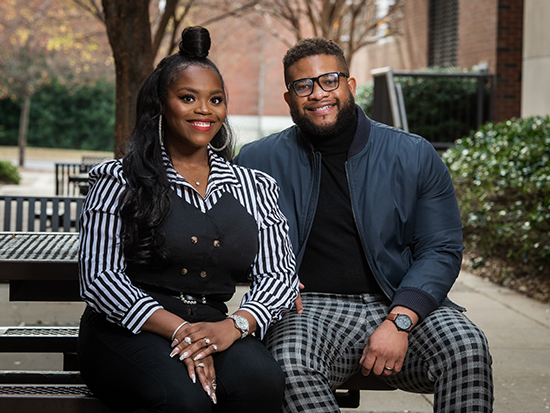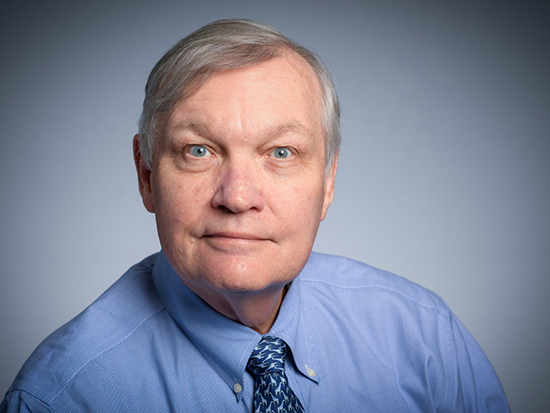 Bianca and Kelvin Ume have been pulling double duty throughout the pandemic: working as contact tracers while juggling full-time jobs, Bianca as a UAB medical and MBA student and Kelvin as an ICU nurse.
Bianca and Kelvin Ume have been pulling double duty throughout the pandemic: working as contact tracers while juggling full-time jobs, Bianca as a UAB medical and MBA student and Kelvin as an ICU nurse.
(Photography: Steve Wood)In January 2021, before vaccines were widely available, Bianca Ume, a student at the University of Alabama at Birmingham Heersink School of Medicine and part of UAB’s dual-degree M.D./MBA program and her husband Kelvin, an intensive care unit nurse at a Birmingham hospital, both contracted COVID. She had a rough time for a week or so. He nearly died.
“It was pretty bad,” Kelvin Ume admitted. “It took me a month to fully beat it and get my lungs back to normal.”
While he recovered, Bianca Ume sat up beside him and studied for her classes and board exams. She also kept managing the efforts of dozens of student contact-tracers working for the UAB School of Public Health, a role she has held since summer 2020. When he recovered, Kelvin went back to the ICU, caring for patients. On the weekends, he was back to contact-tracing as well, as part of a team of part-time staff.
Each shift, Kelvin Ume and his fellow contact-tracers would call a dozen or more people who recently tested positive for COVID-19, letting them know about quarantine guidelines and asking them about friends, family or co-workers they may have been around in the past two weeks. Then they call those close contacts as well.
Before the Delta variant surge took over, the UAB contact tracers added a new role: helping connect people to vaccination.
“In the spring, with the decline in cases, we started to ask, ‘What else can we do with this trained workforce?’” said Andrew Rucks, Ph.D., professor emeritus in the School of Public Health’s Department of Health Care Organization and Policy and principal investigator of the program. “It occurred to me that we could try to help improve the vaccine percentage in the state.”
The school had phone numbers for thousands of Alabamans who had been close contacts of persons who had tested positive for COVID-19 throughout the pandemic. What if their investigators called and offered to set them up with vaccine appointments and answer any questions they had?
 Andrew Rucks, Ph.D.
Andrew Rucks, Ph.D.
(Photography: Steve Wood)“We got lots of questions” about vaccines, Kelvin Ume said. “Some people tell me they’ve heard it will change their DNA or kill them or make them infertile. The good news is there is a lot of positive, factual research out there we can point them to. And I’m an open book about my own experience. I let people know what I have seen and what I went through. And what I see that in the ICU, where most of our patients are unvaccinated.”
During the summer, Bianca Ume started her third year of medical school, which involves a grueling series of rotations through clinical units around UAB Hospital and studied for her board exams all while developing the processes and protocols for executing this new state-wide vaccination assistance program, which began in May 2021.
“In the mornings and afternoons, I would go to the hospital, and then in the evenings I work on contact tracing and the vaccine program,” she said. “I could feel the fatigue and the stress; but honestly, contact-tracing is still a motivator to me. On a day-to-day basis, you are speaking to people from across the state, helping to answer their questions and connect them to critical information.”
Although the dedicated vaccine calls had to take a back seat during the Delta surge, and the current Omicron surge, Bianca Ume encouraged her contact-tracers to ask about vaccination when they can. When their contacts are open to vaccination, the UAB callers offer to help make them appointments at the closest location offering shots, which they look up using the contact’s ZIP code on the website vaccinefinder.org.
These interactions are energizing in the midst of her medical studies, Bianca Ume says. “It’s like a light at the end of the tunnel, to step away from med school and the monotony of study and get immersed in real-life experience,” she said. “When you are in school it is easy to get hyper-focused on what you are doing. To step aside from that and talk to people from across the state, to see what they are experiencing. We are getting the word out and actively striving for real change — a return to a new normal.”
Through November 2021, more than 189 undergraduate, medical and graduate students at UAB, and a similar number of part-time staff, have completed some 45,000 case investigations for the Alabama Department of Public Health.
Everyone age 5 and older is eligible for a COVID-19 vaccine according to the ADPH. UAB is offering vaccines free of charge at the UAB Injection Clinic at The Kirklin Clinic, located at 539 Richard Arrington Jr. Blvd. South in the old Regions Bank space. Appointments are available at uabmedicinevaccine.org, but walkups also are allowed. Find a vaccine nearest you by visiting vaccinefinder.org.
“The dedication of Bianca, Kelvin, the students and staff is really amazing,” Rucks said. “Right now, we can do 100 to 250 cases per day on a great day, but we’re getting up to 300 new cases a day from ADPH based on test results,” Williams said in mid-December. The spread of the Omicron variant means this number is likely to surge again.
Read more about Bianca and Kelvin Ume’s story and the contact tracing program here.